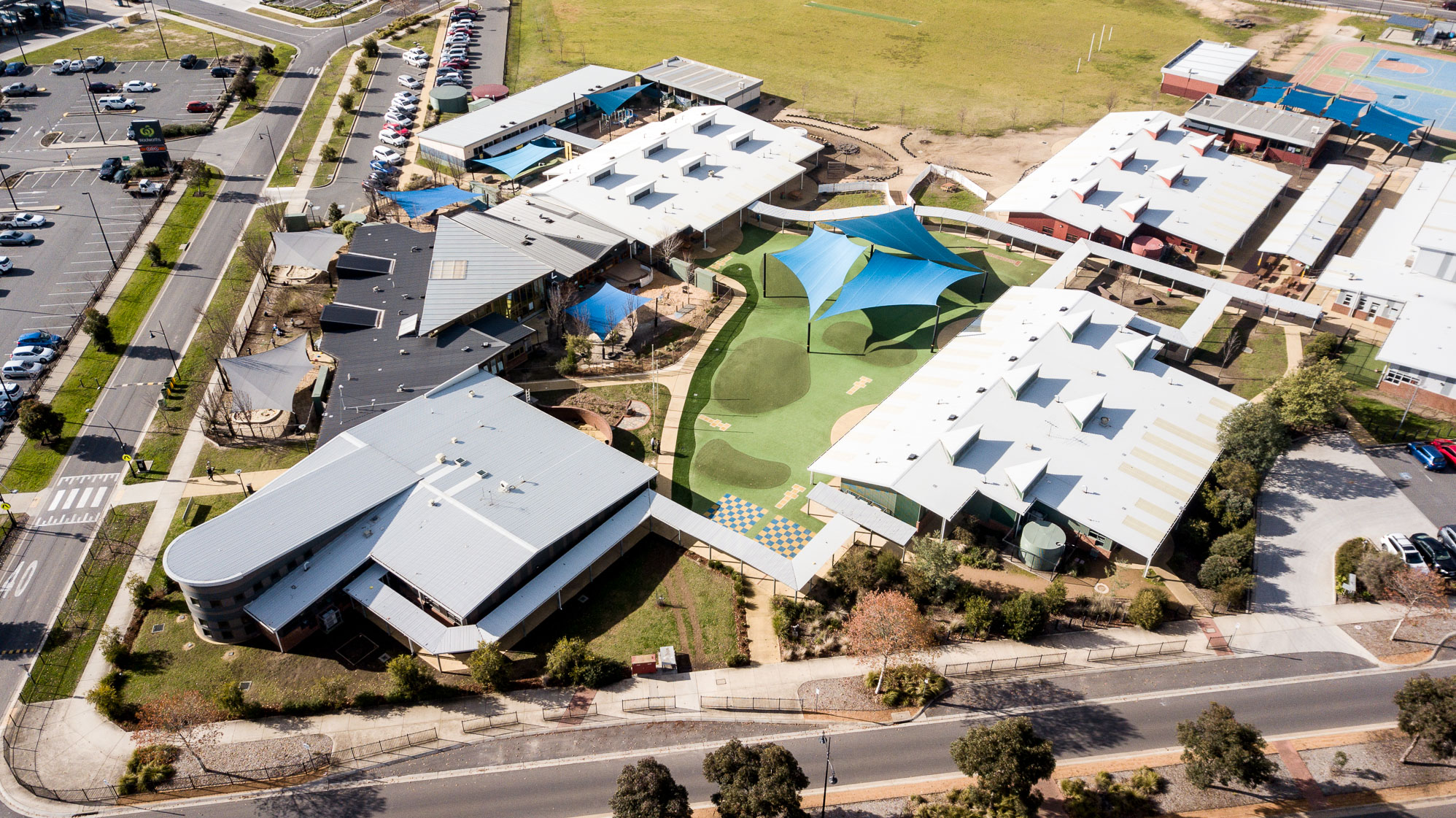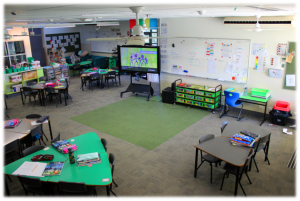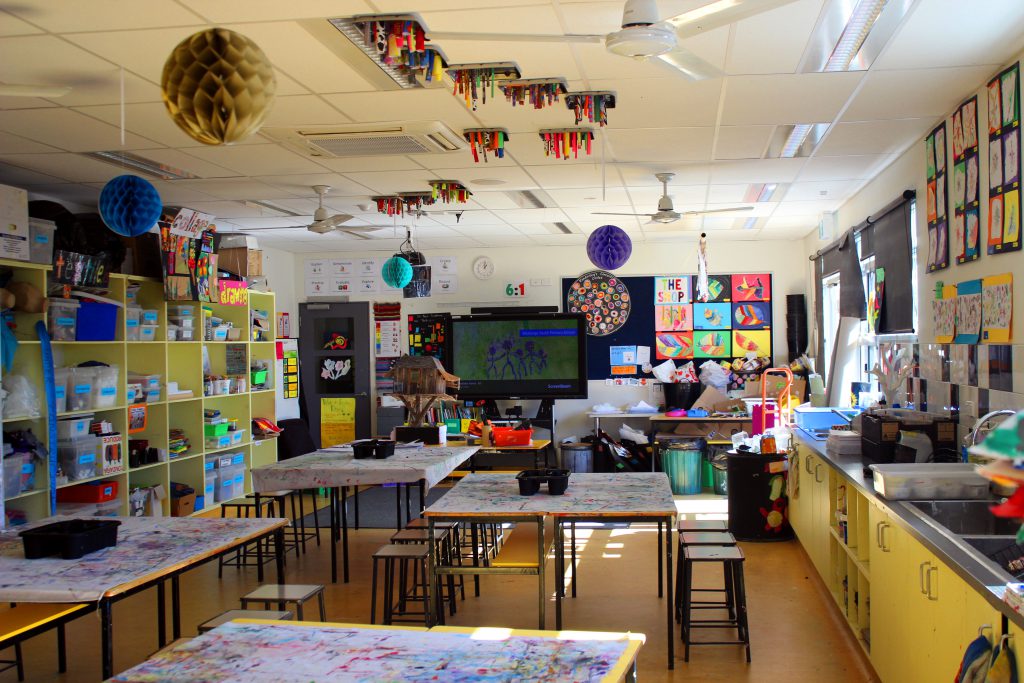21st Century Learning

21st Century Learning
Learning spaces
Our fantastic learning spaces are designed to enable the type of learning to occur that will prepare your children for their future. The learning spaces are flexible in that they have the ability to accommodate individual study, small group work, team teaching, large group presentations and focused teaching groups. The flexibility of the layout helps ensure that teachers can cater to the needs of each student in their care. The types of skills that students need to acquire and the way in which they acquire them has changed vastly as society has changed in particular due to advancements in modern technology.


Interactive classrooms
Every classroom at Wodonga South Primary School is equipped with a 75″ 4K Commbox with interactive display. Students can learn with interactive lessons, experiencing a digital classroom environment that fosters collaboration and teamwork.
Teachers at South create rich technology lessons that combine traditional teaching methods with progressive interactive elements in accordance with the curriculum.
Our School

The Art Room is colourful, vibrant and creative space where students delve into artistic techniques, creative projects and developing individual artistic style. The Visual Art program consists of drawing, painting, modelling, print making, collage, threads and textiles and construction. All year levels have time each week to visit the art room and spend precious moments exploring their creativity. The ‘Elements of Art’, colour and value, line, shape, texture, space and form, are interwoven throughout the curriculum and provide a basis for exploration and experimentation.

The Music Room is a large space that creates and fosters new experiences. Students develop understandings of cultural and indigenous music, develop team work skills and build resilience when learning new skills on instruments. Students have been enlightened to the array of technological creativity that occurs in music by creating their own beats and tracks on software programs. This year we have explored instruments to the likes of guitars, ukuleles, piano, drums and recorder. During lunchtimes and afterschool there are three choirs and one school band which provides extended opportunities and experience. The music room is a space of creation, bravery and fun when exploring new instruments and skills.

Wodonga South Primary School students have the opportunity to participate, explore and experiment in an active and engaging physical education curriculum. Physical Education lessons are designed to prepare students for a healthy and active lifestyle through the development of skills, teamwork and positive healthy attitudes. Wodonga South Primary School has the environment, facilities and equipment to provide children with a wide range of physical and sporting experiences focusing on the progressive development of fundamental motor skills, athletics, fitness and sport education.
At Wodonga South we engage students in learning based on an Inquiry approach in order to develop independent thinkers and learners that will build a variety of transferrable skills such as research, questioning, higher order thinking, collaboration and problem solving that are essential life skills.
At Wodonga South Primary School, we believe that student engagement is promoted when learning is authentic and has a real purpose for the learner.
The Inquiry approach program enables students to respond to big issues, ideas and questions and gain knowledge that will be acquired and applied in an authentic way.
The Inquiry focus follows a two-year plan that is developed across Foundation to Year 6 that encompasses the Victorian Curriculum Learning Areas of Science, Technology, Civics and Citizenship, Economics and Business, Geography, History and aspects of the 4 Capabilities – Critical and Creative Thinking, Ethical, Intercultural and Personal and Social Capabilities.
The Inquiry approach is implemented across the school by:
- Allowing students to make choices in their learning, manage their learning and do their own thinking. The teachers’ role is to facilitate this type of learning to happen rather than delivering facts to students.
- The Inquiry approach follows a cycle of Tuning in, Finding out, Sorting out, Going further and Taking Action.
- Forward planning of the unit is completed by teachers. Generative questions, tuning in, finding out and the culminating task are planned in advance with a high level of student consultation prior to and during the Inquiry. Focus areas chosen for the Inquiry need to be relevant to students’ current and future lives and cover ‘big ideas’ that are real life issues.
- Focus of learning is outlined via understandings and generative questions. The “Going Further” aspect of the unit enables teachers to facilitate students to develop deeper inquiry and deeper understandings of aspects of the Inquiry that they would like to know more about.
- The inquiry approach will enable students to develop a deeper understanding of the area focused on in the Inquiry. This is achieved by learning more about particular aspects of the knowledge rather than having superficial knowledge of a broad range of aspects of the focus. The focus of the Inquiry is narrowed for this purpose.
- Linking to the real world via excursions, incursions and hands on activities are all vital to ensure students engagement in the Inquiry and authenticity of the learning.
- The Inquiry learning process acknowledges individual learning styles, preferences and intelligences within a learning community.
- The Inquiry will challenge students with new learning and incorporate higher order thinking that will develop a deeper understanding.
- Assessment of the learning of the Inquiry occurs via the culminating task and rubrics to establish success criteria. This task needs to be an authentic outcome that students are able to demonstrate what they have learnt. An assessment task that is something the students can do that will make an impact on their lives is essential. This learning needs to link back to the key understandings and generative questions that were identified at the commencement of the unit.
At Wodonga South Primary School, Numeracy takes a hands on approach to students learning. Students are provided with engaging hands on experiences that connect to real world situations where they are encouraged to have a go, make mistakes and reflect on their learning. We provide an engaging and interactive approach to inspire the love of mathematics in students. We do this through, providing students with open-ended tasks and problem solving activities that are hands on ensuring that learning is targeted to all students’ abilities by offering, supporting and extending activities throughout our lesson.
Each Maths session begins with an engaging warm up game with a particular focus on Number. Students may than be explicitly taught a skill/strategy or be provided with a problem where they are encouraged to solve with a partner, group or individually through the use of their own Mathematician’s Toolbox which is filled with a range of strategies and tools that supports their learning and individual needs. Through the use of fishbowls students are provided the opportunity to reflect, explore and explain their understanding and thinking as well as providing variable peer –to –peer feedback.
We celebrate student achievements in Mathematics through the ‘Mathematicians of the week’ award that is handed out during Whole school Assemblies to one individual within each Pod.
At Wodonga South Primary school, we offer students a range of learning experiences within the areas of English. These learning experiences develop students’ skills, self-confidence and independence, while encouraging a positive attitude towards their learning.
Reading lessons are based on the explicit teaching of necessary skills and strategies which support students to become independent readers who are confident in decoding and analysing texts. In Reading, students select ‘good fit’ books and use these texts to practise strategies and skills during Independent Reading. Across the school, we utilise evidence-based teaching approaches such as Guided Reading, Shared Reading, Reciprocal Teaching, Literature Circles and Language Experience. All learning spaces are equipped with classroom libraries, where students have access to a variety of literature at varying levels within their own classrooms. Our classroom libraries promote engagement and expose students to a wide range of text types and authors.
Our Writing sessions begin with a ‘warm-up’, focusing on a particular vocabulary or conventions skill. In the mini-lesson, authorial and secretarial skills are explicitly taught through modelled and shared writing experiences and the use of exemplary texts. Students participate in a Writer’s Workshop, where they practise personal learning goals and the identified learning intention and success criteria. Students are involved in small group writing sessions and individual conferences with the teacher. They reflect on their learning each lesson and give peer feedback to others. In addition to this, students also participate in fortnightly ‘Big Writes’, which is an extended writing session that allows students to practise the skills focused on in the past two weeks, as well as focus on their individual writing goal.
At Wodonga South Primary School, Mathematics takes a hands-on approach to students’ learning. Students are provided with engaging hands-on experiences that connect to real world situations where they are encouraged to have a go, make mistakes and reflect on their learning.
We provide an engaging and interactive approach to inspire the love of mathematics in students. We do this through, providing students with open-ended tasks and problem solving activities that are hands-on ensuring that learning is targeted to all students’ abilities by offering, supporting and extending activities throughout our lesson.
Each Maths session begins with an engaging warm up game with a particular focus on Number. Students may then be explicitly taught a skill/strategy or be provided with a problem where they are encouraged to solve with a partner, group or individually through the use of their own Mathematician’s Toolbox which is filled with a range of strategies and tools that supports their learning and individual needs. Through the use of fishbowls students are provided the opportunity to reflect, explore and explain their understanding and thinking as well as providing variable peer –to –peer feedback. We celebrate student achievements in Mathematics through the ‘Mathematicians of the week’ award that is handed out during Whole school Assemblies to one individual within each Pod.
In order to adequately prepare our students for living in the 21st Century we will ensure:-
- A variety of approaches are used to ensure that students are engaged in their learning
- Learning follows an inquiry approach to respond to big issues, ideas and questions.
- Knowledge should be acquired and applied in an authentic way
- Creative thinking is encouraged and stimulated to allow students to problem solve
- Opportunities for students to collaborate will be provided
- The skills that are developed are transferable to be used in a variety of situations and areas of employment
- Technology will be used as a tool of learning to engage, communicate, gather information and to create
- Students reflect on their learning and use this reflection to set goals for learning
- Interpersonal skills for working with and communicating effectively with others are developed
- Critical thinking skills are developed to enable students to analyze information, hypothesis and draw conclusions.